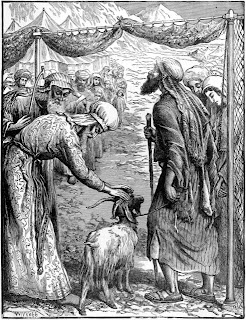Sent to Azazel
He shall take from the congregation of the people of Israel two male goats for a sin offering, and one ram for a burnt offering. Aaron shall offer the bull as a sin offering for himself, and shall make atonement for himself and for his house. He shall take the two goats and set them before the Lord at the entrance of the tent of meeting; and Aaron shall cast lots on the two goats, one lot for the Lord and the other lot for Azazel. Aaron shall present the goat on which the lot fell for the Lord, and offer it as a sin offering; but the goat on which the lot fell for Azazel shall be presented alive before the Lord to make atonement over it, that it may be sent away into the wilderness to Azazel. (Leviticus 16:5-10 RSV)
When he has finished atoning for the holy place and the tent of meeting and the altar, he shall present the live goat. Then Aaron shall lay both his hands on the head of the live goat, and confess over it all the iniquities of the people of Israel, and all their transgressions, all their sins, putting them on the head of the goat, and sending it away into the wilderness by means of someone designated for the task. The goat shall bear on itself all their iniquities to a barren region; and the goat shall be set free in the wilderness. (Leviticus 16:20-22 RSV)Azazel is known to be the evil spirit in the wilderness to whom a scapegoat was sent on Yom Kippur, the Day of Atonement.
We are all familiar with the term 'scapegoat'. Unfortunately, many of us are familiar on a far-too-personal basis. As we read this chapter for our Torah portion this last Shabbat, reality hit home with a vengeance. For some of us, the term scapegoat is so familiar and casual that we have forgotten the true concept of the word. In this portion of Scripture, Moses explains how Aaron would put all the sins of the people upon the head of this innocent animal. As if that weren't bad enough, it was then sent out into the wilderness to fend for itself against predators and hunger - sent to reside with an evil spirit, no less. Tradition has it that once the goat was taken to the wilderness, it would then be forced off a cliff to ensure it would never return to the camp. This paints for us a pretty accurate portrayal of the phrase 'cut off from your people', which interestingly has been described as both being removed from fellowship or (the benefits of) community and/or death as punishment.
In modern times, the formal term scapegoat hasn't changed much. Consider the following definitions (Wiki):
Scapegoating is the practice of singling out any party for unmerited negative treatment or blame. A scapegoat may be a child, employee, peer, ethnic or religious group, or country. A whipping boy or "fall guy" is a form of scapegoat.A medical definition of scapegoating is:
Process in which the mechanisms of projection or displacement are utilised in focusing feelings of aggression, hostility, frustration, etc., upon another individual or group; the amount of blame being unwarranted.Projection and Management:
Unwanted thoughts and feelings can be unconsciously projected onto another who becomes a scapegoat for one's own problems. This concept can be extended to projection by groups. In this case the chosen individual, or group, becomes the scapegoat for the group's problems.Scapegoat Mechanism
Scapegoating is a known practice in management where a lower staff employee is blamed for the mistakes of senior executives. This is often due to lack of accountability in upper management.
Literary critic and philosopher Kenneth Burke first coined and described the expression "scapegoat mechanism" in his books Permanence and Change (1935), and A Grammar of Motives (1945). These works influenced some philosophical anthropologists, such as Ernest Becker and Rene Girard.So, what then is our conclusion? Ultimately, justice is being thwarted through the practice of scapegoating, but is there anything that can be done to stop it once the process is set in motion? It would take strident voices to stem the tide of peer pressure involved in choosing one to be a scapegoat, at least in a group that is bent on self-preservation at all costs. Blame shifting is always wrong, even more so if the appointed scapegoat is innocent of the accusation or blame. Thus, there is no solution for the scapegoat other than to go away quietly, watch from afar and make the best of things with the hope and prayer that eventually justice and honest repentance come to those with dirty hands and a guilty conscience.
Girard developed the concept much more extensively as an interpretation of human culture. In Girard's view, it is humankind, not God, who has the problem with violence. Humans are driven by desire for that which another has or wants (mimetic desire). This causes a triangulation of desire and results in conflict between the desiring parties. This mimetic contagion increases to a point where society is at risk; it is at this point that the scapegoat mechanism is triggered. This is the point where one person is singled out as the cause of the trouble and is expelled or killed by the group. This person is the scapegoat. Social order is restored as people are contented that they have solved the cause of their problems by removing the scapegoated individual, and the cycle begins again. The keyword here is "content", scapegoating serves as a psychological relief for a group of people.
In return for my love they accuse(d) me,
even while I (still) make prayer for them.
~Psalm 109:4, edits by author

Comments